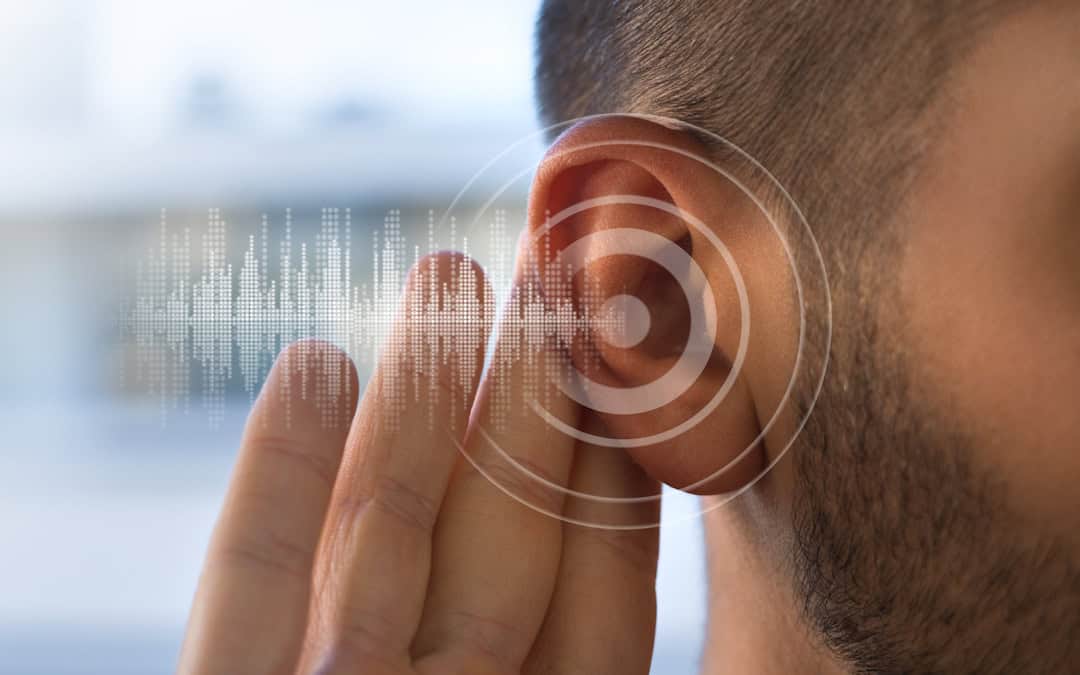More than half of Americans over 75 experience some form of age-related hearing loss, yet most miss the early warning signs completely. Your hearing can start declining long before you notice any difficulty, and the subtle symptoms often masquerade as completely unrelated problems.
The silent nature of hearing loss makes early detection critical.
When hearing problems develop gradually, your brain adapts by working harder to fill in missing sounds. You might dismiss the first signs as background noise being too loud, people mumbling more than usual, or simply feeling tired after conversations. These aren’t character flaws or aging quirks; instead, they’re your body’s way of signaling that your auditory system needs attention.
Recent studies reveal just how widespread undiagnosed hearing issues have become. About 15% of people ages 20 to 69 have already experienced hearing loss due to noise exposure, though many remain completely unaware of their condition. This means millions of Americans are living with hearing decline that affects their relationships, career opportunities, and daily interactions without realizing the connection.
What makes hearing loss particularly challenging is how it impacts more than just your ability to hear sounds. When you struggle to follow conversations, especially in noisy environments, it can lead to social withdrawal and missed connections with family and friends. For children, undetected hearing problems can significantly impact speech development and educational progress. Adults often face reduced job opportunities and increasing isolation as communication becomes more difficult.
Your hearing health deserves the same attention you give to your vision, heart health, and other vital systems. Whether you’ve started noticing changes in your hearing ability or want to protect what you have, recognizing these subtle symptoms before they become major obstacles can make a tremendous difference in your quality of life and cognitive health for years to come.
Subtle Signs You Might Be Missing
These early warning signs slip into your daily routine so gradually that most people attribute them to everything except their hearing. You might blame restaurant acoustics, mumbling speakers, or your own distraction. The reality? Your auditory system has been sending you signals for months or even years.
Don’t wait for obvious symptoms to appear. Recognizing these patterns now can prevent years of missed conversations and social isolation.
When crowded places become communication challenges
Restaurant conversations that once felt effortless now require intense concentration. You find yourself struggling to follow conversations while everyone else seems to hear just fine.
This happens because your ears process high-frequency sounds such as consonants in speech less effectively than low-frequency background noise. The result? You hear the clatter of dishes and rumble of voices clearly, but the actual words become unclear.
This isn’t about the restaurant being too noisy. Your brain simply receives incomplete sound information and works overtime trying to fill in the missing pieces.
“What?” becomes your most common response
Do you catch yourself constantly asking people to repeat themselves? When “what?” becomes your go-to response during conversations, your auditory system is struggling to process sound effectively.
Many people develop coping strategies to avoid the embarrassment of constantly asking for repetition. You might start nodding along to conversations you can’t quite follow, reading lips without realizing it, or positioning yourself strategically in groups to catch more of what’s being said.
The volume wars at home
Your family members complain that the television is too loud, but for you, it sounds perfectly reasonable. You might notice yourself reaching for the remote more often, especially during shows where background music competes with dialogue.
This volume creep happens so gradually that you don’t realize you’re turning it up. What sounds normal to you might be uncomfortably loud for others with typical hearing.
Phone conversations become something to avoid
Telephone calls present a unique challenge because they eliminate all the visual cues you unconsciously rely on during face-to-face conversations. Without seeing someone’s facial expressions, gestures, and lip movements, phone conversations become significantly more difficult to follow.
Many people with developing hearing loss start preferring text messages over phone calls, often without connecting this preference to their hearing changes.
Social exhaustion you can’t explain
Social gatherings that once energized you now leave you feeling drained. Your brain expends tremendous effort trying to piece together fragmented sounds and interpret unclear speech. This “listening fatigue” is real and physically exhausting.
This isolation often accelerates both hearing decline and cognitive changes.
The extra cognitive load required for basic conversation can be so tiring that you begin avoiding social situations altogether. Unfortunately, this isolation often accelerates both hearing decline and cognitive changes, creating a cycle that becomes harder to break over time.
What Causes Hearing Loss in Adults
Most adults experience hearing decline from multiple factors working together rather than a single dramatic event. Understanding these causes helps you spot risks and take protective steps before they cause permanent damage.
Age-related changes your ears can’t avoid
Age remains the strongest predictor of hearing decline. Presbycusis, or age-related hearing loss, affects approximately one in three Americans between 65 and 74 years old. This number jumps to nearly 50% for those older than 75.
What happens inside your ears tells a straightforward but sobering story. The sensory cells in your inner ear naturally deteriorate over time, causing sounds to become muffled or unclear. Scientists haven’t discovered how to prevent this natural decline, making early detection and proper management even more crucial for maintaining your quality of life.
Noise damage you might not expect
Noise exposure ranks as the second most common cause of acquired hearing loss.
The damage doesn’t always come from obvious sources like construction sites or rock concerts. Even everyday activities can harm your hearing over time. Lawn mowers, headphones at high volume, and busy restaurants all contribute to cumulative damage.
Sound levels above 85 decibels can harm your hearing with repeated exposure, while a single loud noise at 120 decibels (like an explosion) can cause immediate damage.
What’s particularly concerning: an estimated 24% of hearing loss in the United States comes from workplace exposures. This means your daily job might be slowly affecting your hearing without you realizing it.
Simple problems with significant impact
Sometimes hearing loss has surprisingly straightforward causes.
Impacted earwax affects about 10% of children and 5% of adults, creating a simple blockage that prevents sound waves from reaching your eardrum.
Ear infections present another common culprit. These conditions can lead to fluid buildup in your middle ear, temporarily reducing your hearing ability. Without proper treatment, recurring infections might cause permanent damage.
Medications that affect your ears
More than 200 medications can damage your ears and hearing. The list includes medications you might never suspect: certain antibiotics (like gentamicin), chemotherapy drugs (cisplatin and carboplatin), high doses of aspirin, and some diuretics.
The warning signs often appear gradually. Tinnitus, known as ringing in your ears, frequently develops before actual hearing loss becomes noticeable. This early symptom gives you a window to discuss alternatives with your doctor before permanent damage occurs.
Your family’s hearing history matters
Your genes influence your susceptibility to hearing loss as you age. The genetic component is stronger than many people realize as studies indicate that approximately 80% of prelingual hearing loss has genetic causes, and even adult-onset hearing loss often carries hereditary elements.
If your parents or siblings developed hearing loss as they aged, you face increased risk. This family history doesn’t guarantee you’ll experience problems, but it does make regular hearing assessments more important for catching changes early.
Understanding Different Types of Hearing Loss
Your auditory system works like a complex relay race, with sound traveling through multiple stages before reaching your brain. Problems at different points in this journey create distinct types of hearing loss, each requiring different approaches to treatment.
When sound can’t get through
Conductive hearing loss occurs when sound waves can’t properly travel through your outer or middle ear. Think of it as a roadblock preventing sound from reaching your inner ear. Common culprits include earwax buildup, middle ear infections, fluid accumulation, ruptured eardrums, or abnormal bone growth.
This type of hearing loss often responds well to medical intervention. With appropriate treatment, many people experience significant improvement or even complete restoration of their hearing.
Inner ear and nerve damage
Sensorineural hearing loss (SNHL) represents the most common type, accounting for about 90% of all permanent hearing loss cases. This condition develops when your inner ear (cochlea) or auditory nerve sustains damage, disrupting the conversion of sound waves into nerve signals your brain can interpret.
People with SNHL typically struggle with speech clarity even when volume seems adequate. Although permanent, treatments like hearing aids can significantly improve quality of life by amplifying your remaining hearing capacity.
Mixed hearing loss
Mixed hearing loss combines elements of both conductive and sensorineural impairments. You might experience blockages in your outer or middle ear alongside inner ear or nerve pathway damage. This dual-system problem creates complex hearing challenges that often require multifaceted treatment approaches.
Someone taking medications that affect their inner ear who also develops a ruptured eardrum would face mixed hearing loss requiring treatment for both conditions.
When your brain can’t process sound
Central hearing loss differs fundamentally because your ears actually function normally. Instead, the problem lies in how your brain processes sound information. This condition stems from dysfunction in your central auditory processing system, including the auditory nerve and brain pathways.
People with central hearing loss can detect sounds but struggle to interpret or understand them. Neurological disorders, brain injuries, strokes, or degenerative diseases commonly trigger this condition, which presents unique challenges for treatment and management.
When to Seek Help and What to Expect
Your hearing changes don’t wait for convenient moments to seek attention. Recognizing when to take action can mean the difference between preserving your hearing and having it deteriorate beyond repair.
What hearing loss actually feels like
Hearing loss rarely announces itself with dramatic fanfare. Instead, it creeps into your daily experience in ways that feel frustratingly vague. High-pitched sounds typically disappear first, making children’s and women’s voices particularly challenging to understand. You might notice that people seem to mumble more often, or conversations sound muffled even when the volume seems adequate.
Many people describe a sensation of fullness or pressure in their ears, even when doctors find nothing physically blocking them. This feeling can be particularly confusing because your ears might look perfectly healthy during examinations.
You might catch yourself watching people’s lips rather than making eye contact during conversations. This unconscious shift to lip-reading happens as your brain works to gather visual cues that supplement the unclear auditory information it’s receiving.
Recognizing the warning signs that demand action
Don’t wait for obvious symptoms to appear. If you answer “yes” to two or more of these questions, professional evaluation becomes essential:
- Do you frequently ask people to repeat themselves during normal conversations?
- Are phone conversations increasingly difficult to follow?
- Do family members complain that your TV volume is too loud?
- Do you feel exhausted after social gatherings that once energized you?
- Do others sound like they’re mumbling more than they used to?
Most people lose their hearing gradually—you may not even notice the changes happening. This gradual decline explains why family members often recognize hearing problems before the person experiencing them does.
When hearing loss becomes a medical emergency
Seek immediate medical attention if you experience sudden hearing loss in one or both ears. This condition, affecting approximately 1 in 5,000 people annually, represents a true medical emergency.
Sudden hearing problems might arrive with additional symptoms including a feeling of fullness, dizziness, or ringing in the affected ear. Treatment effectiveness depends critically on timing as most interventions work best when started within 72 hours of noticing the initial symptoms.
Get urgent medical help if hearing loss occurs alongside symptoms like severe earache, discharge from the ear, or significant dizziness. These combinations can signal serious underlying conditions that require immediate treatment.
What happens during your hearing evaluation
A typical hearing assessment lasts about an hour and involves no discomfort. Your audiologist will discuss your medical history, examine your ears, and conduct hearing tests in a soundproof room.
During the test, you’ll press a button when you hear sounds through headphones, creating an audiogram that maps your hearing thresholds across different frequencies. This detailed picture shows exactly which sounds you’re missing and helps determine the best treatment approach.
Schedule an appointment with the audiologist at Chang Eye Group in Pittsburgh to determine if you have hearing loss and discover what solutions might help you hear better.
Treatment options that can transform your hearing
Treatment approaches depend entirely on what’s causing your hearing loss. The good news: many types of hearing problems respond well to appropriate intervention.
Conductive hearing loss often improves significantly with medical treatment. Options may include antibiotics for infections, surgical procedures for structural problems, or simple removal of earwax blockages.
Sensorineural hearing loss typically requires hearing aids that amplify sounds and improve clarity. Modern hearing aids won’t restore perfect hearing, but they can make sounds louder and significantly clearer. These devices have advanced dramatically in recent years, with many models now offering compatibility with mobile phones, wireless connectivity and sophisticated noise filtering.
For profound hearing loss, cochlear implants might be recommended. These remarkable devices bypass damaged portions of your ear to directly stimulate the auditory nerve, potentially restoring functional hearing even in cases of severe damage.
Remember that addressing hearing loss protects more than just your ability to hear. Getting proper treatment will safeguard your cognitive health, social connections, and quality of life for years to come.
Taking Action to Protect Your Hearing and Health
Hearing loss works quietly, often for years, before you notice anything wrong. The subtle signs we’ve explored such as struggling in noisy restaurants, constantly asking people to repeat themselves, cranking up the TV volume, avoiding phone calls, and feeling drained after social gatherings, deserve your attention, not dismissal.
Early detection can protect both your hearing and your brain health.
Your hearing connects directly to your cognitive function, social relationships, and overall quality of life. When left unaddressed, even mild hearing decline can accelerate brain aging and lead to social isolation that affects your mental and physical wellbeing.
Understanding what’s causing your hearing difficulties—whether age-related changes, noise exposure, earwax buildup, medications, or genetic factors—helps determine the most effective treatment approach. Some types of hearing loss respond well to medical treatment, while others benefit significantly from hearing aids or other assistive devices.
The type of intervention that works best depends on whether you’re dealing with conductive, sensorineural, mixed, or central hearing loss. But here’s what matters most: waiting until hearing problems severely impact your daily life often limits how much improvement is possible.
Don’t wait for obvious symptoms to appear. If you’ve recognized any of the warning signs discussed in this guide, especially sudden changes in your hearing ability, schedule a hearing evaluation promptly. Treatment effectiveness depends heavily on early intervention.
Chang Eye Group in Pittsburgh offers complete hearing assessments with our experienced audiologist who can identify hearing issues before they become major obstacles. Our hearing evaluations help you understand your current hearing status and develop a personalized plan to protect your hearing health for years to come.
Call Chang Eye Group today to schedule your hearing evaluation at one of our convenient locations and take the first step toward protecting your hearing and brain health.
FAQs
Q: What are some early signs of hearing loss that people often overlook?
A: Early signs include difficulty hearing in noisy environments, frequently asking others to repeat themselves, turning up the volume on devices more than others, avoiding phone conversations, and feeling unusually tired after social interactions.
Q: How does age-related hearing loss differ from other types of hearing loss?
A: Age-related hearing loss, or presbycusis, is a natural deterioration of sensory cells in the inner ear that occurs over time. Unlike other types of hearing loss that may be caused by specific events or conditions, age-related hearing loss is a gradual process that affects many people as they get older.
Q: When should someone seek medical help for hearing problems?
A: It’s important to seek medical help if you experience sudden hearing loss in one or both ears, as this can be a medical emergency. Additionally, if you notice persistent changes in your hearing ability or experience symptoms like earache or discharge, it’s advisable to consult a healthcare professional.
Q: What typically happens during a hearing test?
A: A hearing test usually lasts 30-60 minutes and involves discussing your medical history, examining your ears, and conducting a hearing assessment in a soundproof room. You’ll listen to sounds through headphones and indicate when you hear them, resulting in an audiogram that shows your hearing thresholds across different frequencies.
Q: Can hearing loss be treated, and what are the options?
A: Yes, hearing loss can often be treated. Options depend on the type and cause of hearing loss but may include antibiotics for infections, surgery for structural issues, hearing aids to amplify sounds, or cochlear implants for profound hearing loss. The best treatment approach is determined based on individual circumstances and the specific type of hearing loss.






